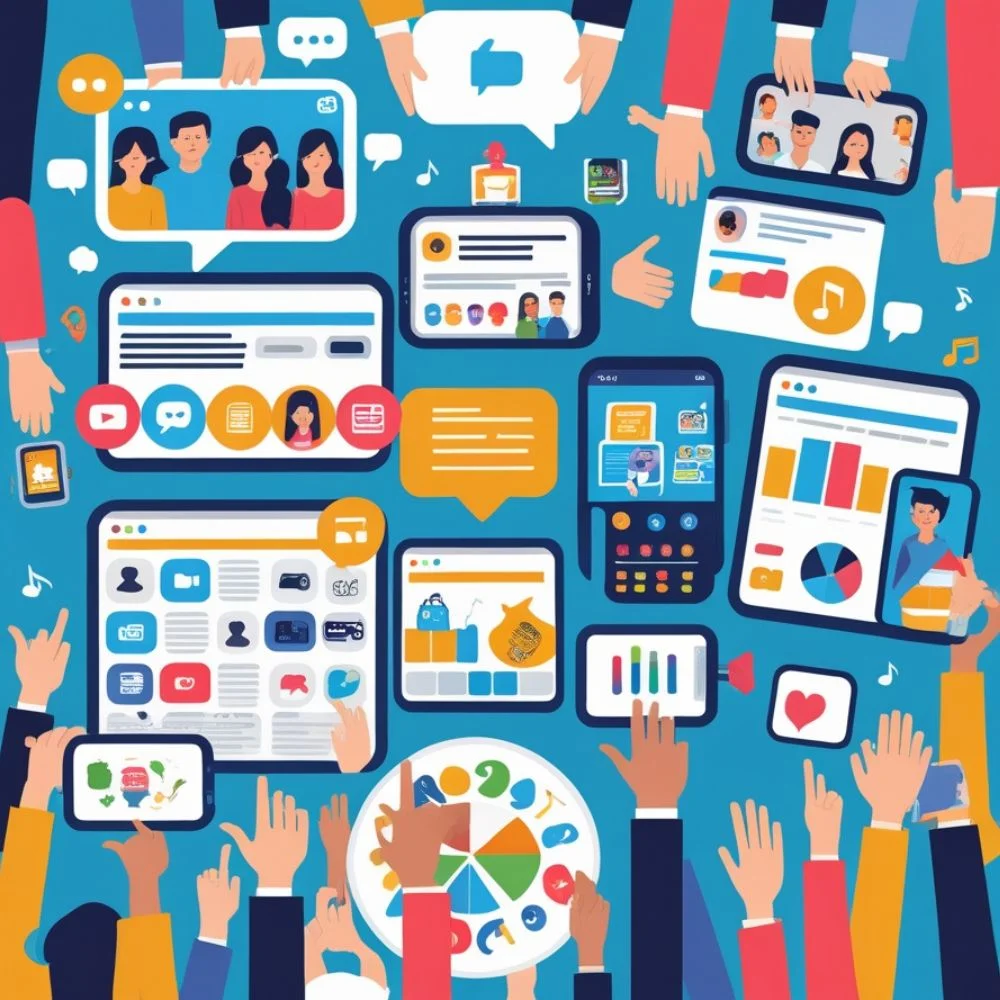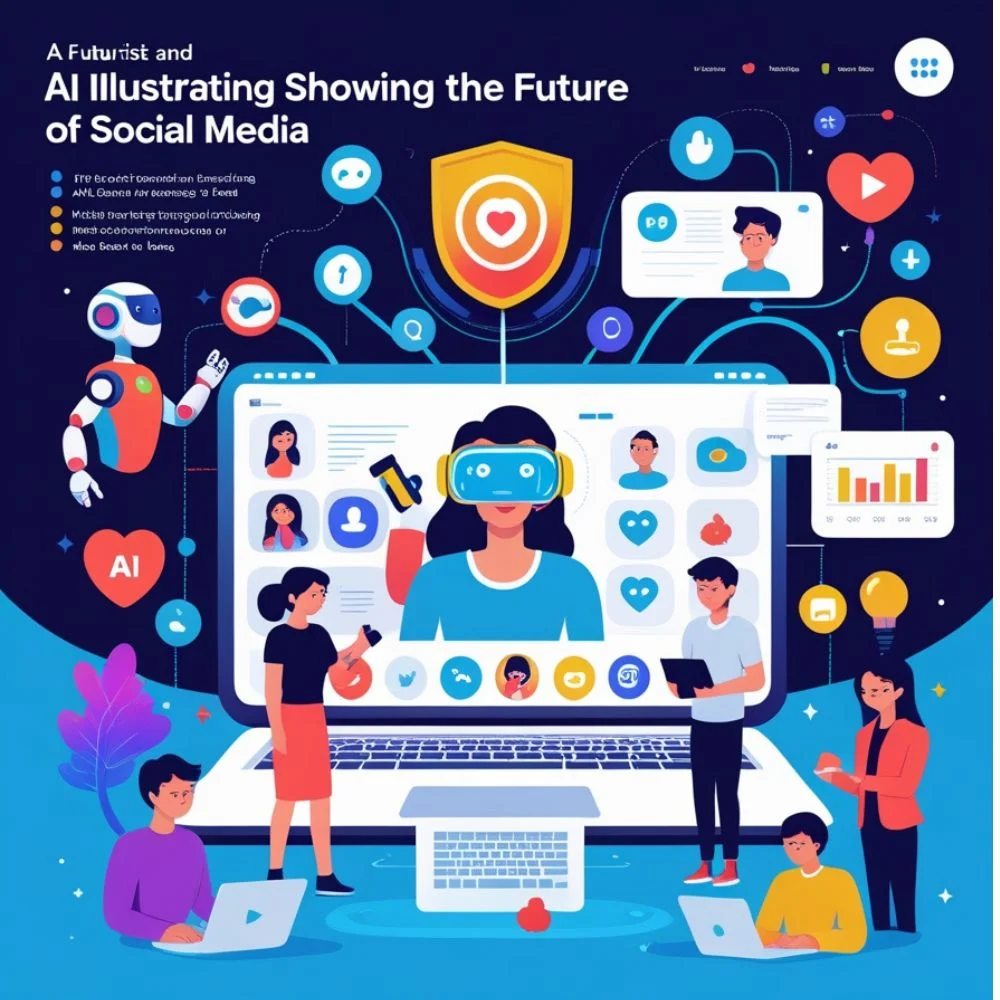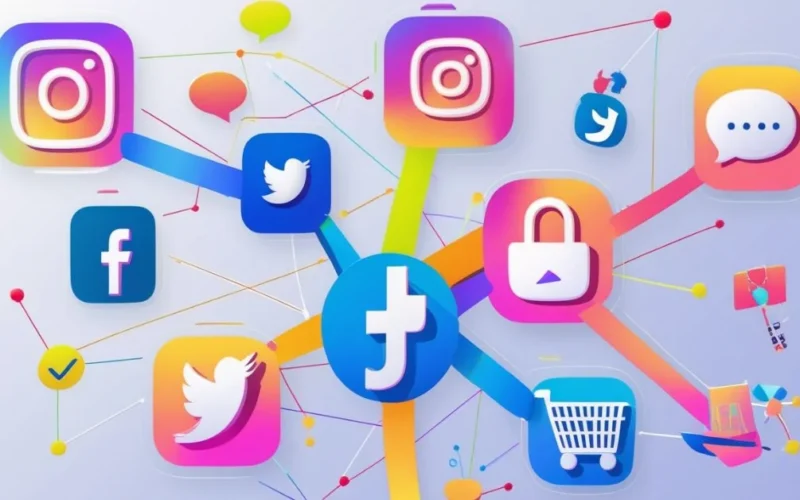Table of Contents
- Introduction
- What Is Social Media?
- The Role of Social Media in Society
- Benefits of Social Media in Society
- The Negative Effects and Risks of Social Media
- How to Use Social Media Responsibly?
- The Role of Social Media in Business
- How Social Media Supports Education?
- The Future of Social Media
- Real-Life Success and Challenges
- Frequently Asked Questions (FAQ):
- Final Thought
Introduction
Social media has become a big part of modern life. Every day, billions of people use platforms like Facebook, Instagram, Twitter, TikTok, LinkedIn, and YouTube. Social media connects people, shares information fast, helps businesses, and influences culture. In this article, we will look at how social media affects society, its benefits, challenges, and its growing role in our daily lives.
What Is Social Media?
Social media refers to websites and apps that let people create, share, and interact with content. People can post photos, videos, text updates, and links. They can also comment, like, share, and message each other instantly.
Popular Social Media Platforms
- Facebook: Used for connecting with friends, joining groups, and sharing updates.
- Instagram: Focuses on photos, videos, and visual storytelling.
- Twitter (X): Great for short text posts, news, and trending topics.
- TikTok: Popular for short, creative videos, challenges, and entertainment.
- LinkedIn: Used for professional networking and job hunting.
The Role of Social Media in Society

Social media has changed how people communicate, work, learn, and entertain themselves.
1. Communication and Connection:
Social media allows instant communication with people anywhere in the world. Families stay in touch, friends share updates, and businesses reach customers directly.
2. Information and News Sharing:
Many people get their news from social media. Breaking news, updates, and live events spread quickly. However, it also creates a risk of spreading false information.
3. Education and Learning:
Students and teachers use social media to share study materials, join online classes, and connect with experts. Educational channels on YouTube and groups on Facebook help people learn new skills.
4. Business and Marketing:
Businesses use social media to promote products, connect with customers, and build brand awareness. Social media marketing is now a key part of business strategy.
- Paid ads target specific audiences.
- Influencers promote brands to their followers.
- Customer feedback helps businesses improve.
5. Entertainment and Creativity:
People share music, art, videos, and memes. Platforms like TikTok, Instagram, and YouTube give everyone a chance to showcase their talents and creativity.
6. Social Movements and Awareness:
Social media has been used to support social causes, organize protests, and spread awareness about important issues like climate change, human rights, and equality.
Benefits of Social Media in Society
Social media plays a huge role in our daily lives. It helps people connect, share ideas, build businesses, and learn new things. But it also brings some problems that we need to manage carefully. In this article, we will fully explore both the positive and negative sides of social media.
1. Global Connections:
- Social media allows people from different countries to meet and talk.
- Cultures are shared through photos, videos, and stories.
- Friendships are made with people from different backgrounds.
2. Support Communities:
- People facing health issues or life challenges can find online support groups.
- Parenting, mental health, and chronic illness groups offer advice and comfort.
- Many people feel stronger knowing others share the same experiences.
3. Job Opportunities and Career Growth
- Platforms like LinkedIn help people find jobs and grow professionally.
- Professionals can share knowledge, build networks, and learn new skills.
- Many freelancers and businesses use social media to find clients.
4. Easy Access to Information:
- News, research, and expert opinions are easily available.
- People can watch tutorials to learn skills from cooking to coding.
- Updates on world events are shared instantly.
5. Spreading Awareness:
- Charities and activists use social media to share their causes.
- Fundraising for medical needs and disasters is easier.
6. Encouraging Creativity and Innovation:
- Artists, musicians, and writers can share their work with the world.
- Many turn hobbies into full-time careers.
- Platforms like YouTube, TikTok, and Instagram offer global exposure.
The Negative Effects and Risks of Social Media
While social media offers many benefits, it also comes with serious problems that can affect individuals and society.
Privacy Risks:
- Personal information can be misused if shared carelessly.
- Hackers may steal private data or access personal accounts.
- Many people do not realize how much personal information they reveal.
Cyberbullying and Online Harassment:
- Some users face bullying, threats, and hate speech online.
- This can cause emotional stress, anxiety, and depression.
- Young people are especially at risk.
Social Media Addiction:
- Spending too much time online can lead to addiction.
- It affects sleep, work, and personal relationships.
- Constant notifications increase stress levels.
The Spread of False Information:
- Misinformation spreads fast on social media.
- People often share news without checking its truth.
Mental Health Struggles:
- Seeing others’ perfect lives can lower self-confidence.
- Comparing oneself to influencers can cause depression and anxiety.
- Teenagers are particularly vulnerable to these effects.
Relationship Problems:
- Excessive time online can harm personal relationships.
- Family and friends may feel ignored.
- Face-to-face conversations may decrease.
Political Influence and Manipulation;
- Social media can spread propaganda and false political information.
- Elections may be unfairly influenced.
- Divisions between groups may grow due to extreme content.
How to Use Social Media Responsibly?
With mindful habits, people can enjoy social media while avoiding its dangers.
1. Protect Personal Information:
- Share only what is necessary.
- Use strong passwords and privacy settings.
- Be careful about who can see your posts.
2. Manage Screen Time:
- Set daily time limits for social media.
- Take regular breaks from screens.
- Use tracking apps to monitor usage.
3. Check the Truth Before Sharing:
- Always verify news before sharing it.
- Follow trustworthy sources.
- Avoid spreading rumors or unproven stories.
4. Practice Good Online Behavior
- Stay polite and avoid arguments.
- Encourage positive discussions.
- Report harmful or abusive content.
5. Guide Children’s Use of Social Media:
- Teach kids about online safety and privacy.
- Monitor what children post and who they interact with.
- Use parental controls where necessary.
The Role of Social Media in Business
Social media is a powerful tool for business growth and customer engagement.
1. Marketing and Advertising:
- Businesses run targeted ads to specific groups of people.
- Content marketing builds trust with customers.
- Influencers promote products to large audiences.
2. Connecting with Customers
- Companies talk directly with customers online.
- Feedback helps improve products and services.
- Fast customer service builds loyalty.
3. Building Strong Brands:
- Regular posting helps build a brand’s identity.
- Creative content attracts new followers.
- Transparency earns trust.
4. Boosting Online Sales:
- Many businesses sell products directly on social media.
- Live product demonstrations attract buyers.
- Exclusive deals encourage more sales.
How Social Media Supports Education?
Social media makes learning more accessible and fun.
1. Online Classes and Webinars
- Teachers hold virtual classes on platforms like Zoom.
- Educational videos on YouTube help students learn new topics.
- Webinars allow learning from experts worldwide.
2. Group Discussions and Forums:
- Students create study groups to share notes and ideas.
- Forums like Reddit and Quora offer helpful advice.
- Collaboration improves understanding.
3. Learning New Skills:
- Tutorials teach skills like graphic design, languages, and coding.
- Online courses offer certificates and degrees.
- Skills learned online help people advance in their careers.
The Future of Social Media

Social media will continue to change and improve as technology advances.
1. Smarter Content with AI:
- Artificial intelligence will personalize content for each user.
- Users will see more content they enjoy.
- This will make social media more engaging.
2. Virtual Reality (VR) and Augmented Reality (AR):
- Social media will become more immersive.
- Users may attend virtual concerts, meetings, or events.
- Shopping and learning will feel more interactive.
3. Stronger Rules and Regulations:
- Governments may introduce stricter laws for online safety.
- Laws will fight misinformation and protect privacy.
- Platforms may face penalties for not following regulations.
4. More Mental Health Tools:
- Platforms will offer features to protect mental health.
- Tools may limit harmful content and manage screen time.
- Positive content will be encouraged.
5. New Job Opportunities
- New jobs will appear in digital marketing, data analysis, and content creation.
- Careers in social media management will grow.
- Many industries will benefit from these changes.
Real-Life Success and Challenges
Social media has already changed many people’s lives.
1. Positive Example:
- Business Growth: Small shops have grown into global brands using Instagram and Facebook.
- Charity Fundraising: Platforms like GoFundMe have helped raise money for emergencies and medical needs.
- Talent Discovery: Many musicians, comedians, and artists gained fame on YouTube and TikTok.
2. Negative Examples:
- Cyberbullying: Many young people suffer from online bullying.
- Misinformation: False news causes confusion and fear.
- Privacy Issues: Data breaches have exposed personal information to hackers.
Frequently Asked Questions (FAQ):
Q. Is social media good or bad for society?
Social media has both good and bad effects. It depends on how people use it. Responsible use can bring many benefits.
Q. How can I protect my privacy on social media?
Use strong passwords, check privacy settings, avoid sharing personal details, and be careful with whom you connect.
Q. Can social media affect mental health?
Yes, too much use or negative interactions can cause stress, anxiety, and depression. Limiting use and focusing on positive content can help.
Final Thought
Social media is a powerful tool that shapes modern society in many ways. It helps people connect, learn, and grow, but it also brings challenges that require careful handling. By using social media responsibly, individuals and businesses can enjoy its many benefits while staying safe. As technology evolves, social media will remain a vital part of our daily lives, offering new ways to connect, share, and create.
Also Read this: Remembering Instagram’s Golden Era


